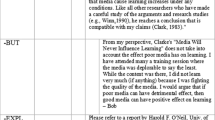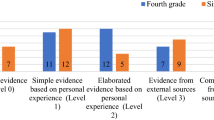Abstract
This study investigated the influence of requiring elementary students to participate in a detective role-playing game, within which students had to be for or against a controversial issue. Three intact sixth grade classes (N = 94) participated in this study. One class of students was asked to search for supporting evidence for one side of an online ethics dilemma and to create convincing arguments (pro), while another searched for opposing evidence (con). The third other class searched for both supporting and opposing evidence (balanced). A one-way multivariate analysis of covariance shows that the balanced role-play strategy had a notable positive impact on the students’ ability to construct cogent arguments.
Similar content being viewed by others
References
Andriessen, J., Baker, M., & Suthers, D. (Eds.). (2003). Arguing to learn: Confronting cognitions in computer-supported collaborative learning environments. Netherlands: Springer.
Bell, P. (2000). Scientific arguments as learning artifacts: Designing for learning from the web with KIE. International Journal of Science Education, 22(8), 797–817. doi:10.1080/095006900412284.
Berland, L. K., & Reiser, B. J. (2009). Making sense of argumentation and explanation. Science Education, 93(1), 26–55.
Braund, M., Scholtz, Z., Sadeck, M., & Koopman, R. (2013). First steps in teaching argumentation: A South African study. International Journal of Educational Development, 33(2), 175–184. doi:10.1016/j.ijedudev.2012.03.007.
Cavalli-Sforza, V., Lesgold, A. M., & Weiner, A. W. (1992). Strategies for contributing to collaborative arguments. Paper presented at the the Fourteenth Annual Conference of the Cognitive Science Society, Hillsdale.
Chinn, C. A., & Brewer, W. F. (1998). An empirical test of a taxonomy of responses to anomalous data in science. Journal of Research in Science Teaching, 35(6), 623–654. doi:10.1002/(sici)1098-2736(199808)35:6<623:aid-tea3>3.0.co;2-o.
Cho, K. L., & Jonassen, D. H. (2002). The effects of argumentation scaffolds on argumentation and problem solving. Educational Technology Research and Development, 50(3), 5–22.
Driver, R., Newton, P., & Osborne, J. (2000). Establishing the norms of scientific argumentation in classrooms. Science Education, 84(3), 287–312.
Erduran, S., Simon, S., & Osborne, J. (2004). TAPping into argumentation: Developments in the application of Toulmin’s argument pattern for studying science discourse. Science Education, 88(6), 915–933.
Felton, M. K. (2004). The development of discourse strategies in adolescent argumentation. Cognitive Development, 19(1), 35–52. doi:10.1016/j.cogdev.2003.09.001.
Glassner, A., Weinstock, M., & Neuman, Y. (2005). Pupils’ evaluation and generation of evidence and explanation in argumentation. British Journal of Educational Psychology, 75(1), 105–118. doi:10.1348/000709904x22278.
Huang, H.-H., Hsu, J. S.-C., & Ku, C.-Y. (2012). Understanding the role of computer-mediated counter-argument in countering confirmation bias. Decision Support Systems, 53(3), 438–447. doi:10.1016/j.dss.2012.03.009.
Jiménez-Aleixandre, M., & Erduran, S. (2007). Argumentation in Science Education: An Overview. In S. Erduran & M. Jiménez-Aleixandre (Eds.), Argumentation in Science Education (Vol. 35, pp. 3–27). Netherlands: Springer.
Jonassen, D., & Kim, B. (2010). Arguing to learn and learning to argue: Design justifications and guidelines. Educational Technology Research and Development, 58(4), 439–457. doi:10.1007/s11423-009-9143-8.
Kelly, G. J., Druker, S., & Chen, C. (1998). Students’ reasoning about electricity: Combining performance assessments with argumentation analysis. International Journal of Science Education, 20(7), 849–871. doi:10.1080/0950069980200707.
Kelly, G. J., & Takao, A. (2002). Epistemic levels in argument: An analysis of university oceanography students’ use of evidence in writing. Science Education, 86(3), 314–342. doi:10.1002/sce.10024.
Klaczynski, P. A. (2000). Motivated scientific reasoning biases, epistemological beliefs, and theory polarization: A two-process approach to adolescent cognition. Child Development, 71(5), 1347.
Kolstoe, S. D. (2000). Consensus projects: Teaching science for citizenship. International Journal of Science Education, 22, 645–664.
Kuhn, D. (1991). The skills of argument. Cambridge: Cambridge University Press.
Kuhn, D. (2005). Developing argument skills education for thinking (pp. 149–173). Cambridge, MA: Harvard University Press.
Kuhn, D., & Udell, W. (2003). The development of argument skills. Child Development, 74(5), 1245–1260. doi:10.1111/1467-8624.00605.
Kuhn, D., & Udell, W. (2007). Coordinating own and other perspectives in argument. Thinking and Reasoning, 13(2), 90–104. doi:10.1080/13546780600625447.
Limon, M. S., Turner, M. M., & Zompetti, J. P. (2008). Informal arguing: The likelihood of providing arguments, rebuttals, refutations, and evidence in an argumentative interaction. Argumentation and Advocacy: The Journal of the American Forensic Association, 45(1), 37–48.
Linn, M. C. (2000). Designing the knowledge integration environment. International Journal of Science Education, 22(8), 781–796. doi:10.1080/095006900412275.
Lizotte, D. J., McNeill, K. L., & Krajcik, J. (2004). Teacher practices that support students’ construction of scientific explanations in middle school classrooms. Paper presented at the Proceedings of the 6th international conference on Learning sciences, Santa Monica, California.
Lord, C. G., Lepper, M. R., & Preston, E. (1984). Considering the opposite: A corrective strategy for social judgment. Journal of Personality and Social Psychology, 47(6), 1231–1243.
Lord, C. G., Ross, L., & Lepper, M. R. (1979). Biased assimilation and attitude polarization: The effects of prior theories on subsequently considered evidence. Journal of Personality and Social Psychology, 37(11), 2098–2109.
Macpherson, R., & Stanovich, K. E. (2007). Cognitive ability, thinking dispositions, and instructional set as predictors of critical thinking. Learning and Individual Differences, 17(2), 115–127. doi:10.1016/j.lindif.2007.05.003.
McAlister, S., Ravenscroft, A., & Scanlon, E. (2004). Combining interaction and context design to support collaborative argumentation using a tool for synchronous CMC. Journal of Computer Assisted learning, 20(3), 194–204. doi:10.1111/j.1365-2729.2004.00086.x.
McNeill, K. L. (2009). Teachers’ use of curriculum to support students in writing scientific arguments to explain phenomena. Science Education, 93(2), 233–268. doi:10.1002/sce.20294.
McNeill, K. L., & Krajcik, J. (2008). Scientific explanations: Characterizing and evaluating the effects of teachers’ instructional practices on student learning. Journal of Research in Science Teaching, 45(1), 53–78. doi:10.1002/tea.20201.
McNeill, K. L., & Krajcik, J. (2009). Synergy between teacher practices and curricular scaffolds to support students in using domain-specific and domain-general knowledge in writing arguments to explain phenomena. Journal of the Learning Sciences, 18(3), 416–460.
McNeill, K. L., Lizotte, D. J., Krajcik, J., & Marx, R. W. (2006). Supporting students’ construction of scientific explanations by fading scaffolds in instructional materials. Journal of the Learning Sciences, 15(2), 153–191. doi:10.1207/s15327809jls1502_1.
Mintzes, J. J. (2010). Learning argumentation skills though instruction in socioscientific issues: The effect of ability level. International Journal of Science and Mathematics Education, 8(6), 993–1017.
Nussbaum, E. M., & Kardash, C. M. (2005). The effects of goal instructions and text on the generation of counterarguments during writing. Journal of Educational Psychology, 97(2), 157–169.
Osborne, J. (2010). Arguing to learn in science: The role of collaborative, critical discourse. Science, 328(5977), 463–466. doi:10.1126/science.1183944.
Osborne, J., Erduran, S., & Simon, S. (2004). Enhancing the quality of argumentation in school science. Journal of Research in Science Teaching, 41(10), 994–1020.
Patronis, T., Potari, D., & Spiliotopoulou, V. (1999). Students’ argumentation in decision-making on a socio-scientific issue: Implications for teaching. International Journal of Science Education, 21(7), 745–754. doi:10.1080/095006999290408.
Perkins, D. N. (1985). Postprimary education has little impact on informal reasoning. Journal of Educational Psychology, 77(5), 562–571. doi:10.1037/0022-0663.77.5.562.
Perkins, D. N., Farady, M., & Bushey, B. (1991). Everyday reasoning and the roots of intelligence. In J. Voss, D. N. Perkins, & J. Segal (Eds.), Informal reasoning and education (pp. 83–105). Hillsdale, NJ: Lawrence Erlbaum Associates Inc.
Radinsky, J. (2008). Students’ sense-making with visual data in small-group argumentation. Paper presented at the International Conference of the Learning Sciences, Utrecht, The Netherlands.
Ricci, K., Salas, E., & Cannon-Bowers, J. A. (1996). Do computer-based games facilitate knowledge acquisition and retention? Military Psychology, 8(4), 295–307.
Sandoval, W. A. (2003). Conceptual and epistemic aspects of students’ scientific explanations. Journal of the Learning Sciences, 12(1), 5–51.
Sandoval, W. A., & Millwood, K. A. (2005). The quality of students’ use of evidence in written scientific explanations. Cognition and Instruction, 23(1), 23–55. doi:10.1207/s1532690xci2301_2.
Scheuer, O., Loll, F., Pinkwart, N., & McLaren, B. (2010). Computer-supported argumentation: A review of the state of the art. International Journal of Computer-Supported Collaborative Learning, 5(1), 43–102.
Schwarz, B. (2003). Collective reading of multiple texts in argumentative activities. International Journal of Educational Research, 39(1–2), 133–151. doi:10.1016/S0883-0355(03)00077-6.
Simkins, D. W., & Steinkuehler, C. (2008). Critical ethical reasoning and role-play. Games and Culture, 3(3–4), 333–355.
Simon, S., Erduran, S., & Osborne, J. (2006). Learning to teach argumentation: Research and development in the science classroom. International Journal of Science Education, 28(2–3), 235–260.
Simonneaux, L. (2001). Role-play or debate to promote students’ argumentation and justification on an issue in animal transgenesis. International Journal of Science Education, 23(9), 903–927.
Spatariu, A., Hartley, K., Schraw, G., Bendixen, L. D., & Quinn, L. F. (2007). The influence of the discussion leader procedure on the quality of arguments in online discussions. Journal of Educational Computing Research, 37(1), 83–103.
Stanovich, K. E., & West, R. F. (2008). On the failure of cognitive ability to predict myside and one-sided thinking biases. Thinking & Reasoning, 14(2), 129–167. doi:10.1080/13546780701679764.
Suthers, D. D. (2001). Architectures for computer supported collaborative learning. Paper presented at the IEEE International Conference on Advanced Learning Technologies (ICALT 2001), Madison.
Suthers, D. D., Vatrapu, R., Medina, R., Joseph, S., & Dwyer, N. (2008). Beyond threaded discussion: Representational guidance in asynchronous collaborative learning environments. Computers & Education, 50(4), 1103–1127. doi:10.1016/j.compedu.2006.10.007.
The Intellectual Property Office website for kids. (2013). Retrieved 10/9, 2013. http://www.tipo.gov.tw/kid/index.html.
Toulmin, S. (1958). The uses of argument. Cambridge, England: Cambridge University Press.
Weinberger, A., Stegmann, K., & Fischer, F. (2007). Knowledge convergence in collaborative learning: Concepts and assessment. Learning and Instruction, 17(4), 416–426. doi:10.1016/j.learninstruc.2007.03.007.
Zohar, A., & Nemet, F. (2002). Fostering students’ knowledge and argumentation skills through dilemmas in human genetics. Journal of Research in Science Teaching, 39(1), 35–62.
Acknowledgments
This research was supported by the National Science Council of the Republic of China (ROC) under Grant No. NSC-100-2511-S-003-045-MY3.
Author information
Authors and Affiliations
Corresponding author
Rights and permissions
About this article
Cite this article
Lin, CH., Chiu, CH., Hsu, CC. et al. The Influence of Playing a for or Against a Controversial Position on Elementary Students’ Ability to Construct Cogent Arguments. Asia-Pacific Edu Res 24, 409–418 (2015). https://doi.org/10.1007/s40299-014-0193-2
Published:
Issue Date:
DOI: https://doi.org/10.1007/s40299-014-0193-2




